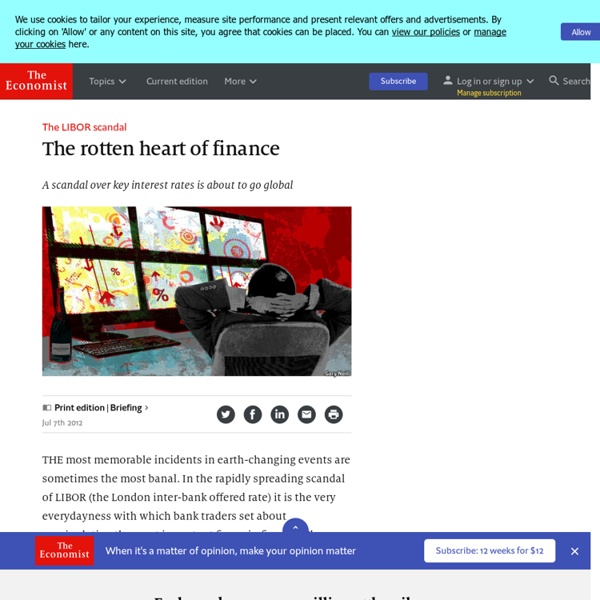The LIBOR scandal: The rotten heart of finance

TED Blog
Home
Français Follow us E-mail Alerts Blogs What's new JAPAN: Half a century of OECD membership 4 April 2014 Japan joined the OECD in 1964, the same year it hosted the summer Olympic Games in Tokyo. ECONOMY: Europe’s reforms beginning to pay off but continued effort needed 3 April 2014 Action taken by many European countries to return their public finances to health are beginning to pay off, says the OECD. EDUCATION: Singapore and Korea top OECD’s first PISA problem-solving test 1 April 2014 Students from Singapore and Korea have performed best in the OECD PISA first assessment of creative problem-solving. FINANCE: Sovereign borrowing set to fall in 2014 28 March 2014 Borrowing operations by OECD governments are set to decrease, as their borrowing needs continue to decline, according to a new OECD report. SOCIETY: Urgent action needed to tackle rising inequality and social divisions More news Focus OECD Forum, Paris, 5-6 May 2014 Read more Better Life Index About Countries Topics Statistics Publications
Bringing the Information to the People | World Future Society - Nightly
Although digital divides between the world’s industrialized and developing areas loom large, development experts are finding ways to cross them. Research institutions such as the World Bank are making their libraries freely available to the global public; while governments and nonprofit groups deploy new open-source software, open-content tools, and wi-fi intranets to empower even the remotest villagers in Earth’s most underdeveloped zones to access data and work with it, or to create their own data and share it. “Democratizing Development through Wikipedia and Other Open Solutions,” a forum that the World Bank and Wikimédia France co-hosted Wednesday, July 11, at the World Bank headquarters in Washington, DC, explored these trends. The World Bank exemplifies the phenomenon. In April 2010, it made its data sets available online for free in six languages. Wikipedia is, of course, a pioneer in free online information. “We’re trying to increase participation in the developing world.
Related:
Related:



